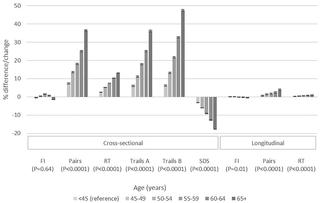Our official English website, www.x-mol.net, welcomes your
feedback! (Note: you will need to create a separate account there.)
Age and cognitive decline in the UK Biobank.
PLOS ONE ( IF 2.9 ) Pub Date : 2019-03-18 , DOI: 10.1371/journal.pone.0213948 Marilyn C Cornelis 1 , Yamin Wang 2 , Thomas Holland 2 , Puja Agarwal 2 , Sandra Weintraub 3, 4 , Martha Clare Morris 2
PLOS ONE ( IF 2.9 ) Pub Date : 2019-03-18 , DOI: 10.1371/journal.pone.0213948 Marilyn C Cornelis 1 , Yamin Wang 2 , Thomas Holland 2 , Puja Agarwal 2 , Sandra Weintraub 3, 4 , Martha Clare Morris 2
Affiliation

|
OBJECTIVES
Age-related cognitive decline is a well-known phenomenon after age 65 but little is known about earlier changes and prior studies are based on relatively small samples. We investigated the impact of age on cognitive decline in the largest population sample to date including young to old adults.
METHOD
Between 100,352 and 468,534 participants aged 38-73 years from UK Biobank completed at least one of seven self-administered cognitive functioning tests: prospective memory (PM), pairs matching (Pairs), fluid intelligence (FI), reaction time (RT), symbol digit substitution, trail making A and B. Up to 26,005 participants completed at least one of two follow-up assessments of PM, Pairs, FI and RT. Multivariable regression models examined the association between age (<45[reference], 45-49, 50-54, 55-59, 60-64, 65+) and cognition scores at baseline. Mixed models estimated the impact of age on cognitive decline over follow-up (~5.1 years).
RESULTS
FI was higher between ages 50 and 64 and lower at 65+ compared to <45 at baseline. Performance on all other baseline tests was lower with older age: with increasing age category, difference in test scores ranged from 2.5 to 7.8%(P<0.0001). Compared to <45 at baseline, RT and Pairs performance declined faster across all older age cohorts (3.0 and 1.2% change, respectively, with increasing age category, P<0.0001). Cross-sectional results yielded 8 to 12-fold higher differences in RT and Pairs with age compared to longitudinal results.
CONCLUSIONS
Our findings suggest that declines in cognitive abilities <65 are small. The cross-sectional differences in cognition scores for middle to older adult years may be due in part to age cohort effects.
中文翻译:

英国生物库中的年龄和认知能力下降。
目的与年龄有关的认知能力下降是65岁以后的一种众所周知的现象,但对早期变化知之甚少,而先前的研究是基于相对较少的样本进行的。我们调查了迄今为止最大的人口样本(包括年轻人到老年人)中年龄对认知能力下降的影响。方法来自英国生物银行的年龄在38-73岁之间的100,352至468,534名参与者完成了以下七个自我管理的认知功能测试中的至少一项:前瞻性记忆(PM),配对匹配(Pairs),体液智力(FI),反应时间(RT) ,符号数字替换,追踪A和B。多达26,005名参与者至少完成了对PM,Pairs,FI和RT的两次后续评估中的至少一项。多变量回归模型检查了年龄之间的关联(<45 [参考],45-49、50-54、55-59、60-64,65岁以上)和基线的认知分数。混合模型估计了随访期间(〜5.1年)年龄对认知能力下降的影响。结果FI在50岁至64岁之间较高,在65岁以上较低,而基线时为<45岁。其他所有基线测试的表现都随着年龄的增长而降低:随着年龄类别的增加,测试得分的差异在2.5%至7.8%之间(P <0.0001)。与基线时的<45相比较,在所有老年队列中,RT和Pairs表现下降得更快(随年龄类别的增加,分别下降3.0%和1.2%,P <0.0001)。与纵向结果相比,横截面结果显示RT和Pairs与年龄的差异高8到12倍。结论我们的发现表明,认知能力<65的下降很小。
更新日期:2019-03-19
中文翻译:

英国生物库中的年龄和认知能力下降。
目的与年龄有关的认知能力下降是65岁以后的一种众所周知的现象,但对早期变化知之甚少,而先前的研究是基于相对较少的样本进行的。我们调查了迄今为止最大的人口样本(包括年轻人到老年人)中年龄对认知能力下降的影响。方法来自英国生物银行的年龄在38-73岁之间的100,352至468,534名参与者完成了以下七个自我管理的认知功能测试中的至少一项:前瞻性记忆(PM),配对匹配(Pairs),体液智力(FI),反应时间(RT) ,符号数字替换,追踪A和B。多达26,005名参与者至少完成了对PM,Pairs,FI和RT的两次后续评估中的至少一项。多变量回归模型检查了年龄之间的关联(<45 [参考],45-49、50-54、55-59、60-64,65岁以上)和基线的认知分数。混合模型估计了随访期间(〜5.1年)年龄对认知能力下降的影响。结果FI在50岁至64岁之间较高,在65岁以上较低,而基线时为<45岁。其他所有基线测试的表现都随着年龄的增长而降低:随着年龄类别的增加,测试得分的差异在2.5%至7.8%之间(P <0.0001)。与基线时的<45相比较,在所有老年队列中,RT和Pairs表现下降得更快(随年龄类别的增加,分别下降3.0%和1.2%,P <0.0001)。与纵向结果相比,横截面结果显示RT和Pairs与年龄的差异高8到12倍。结论我们的发现表明,认知能力<65的下降很小。











































 京公网安备 11010802027423号
京公网安备 11010802027423号